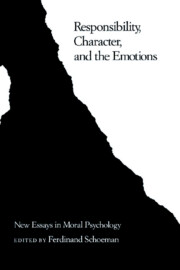Book contents
- Frontmatter
- Contents
- List of Contributors
- Acknowledgments
- 1 Introduction
- Part I Responsibility and Character
- Part II Responsibility and Culpability
- 8 The Moral Worth of Retribution
- 9 Nonmoral Guilt
- 10 Provocation and Culpability
- 11 Responsibility and the Limits of Evil: Variations on a Strawsonian Theme
- 12 Statistical Norms and Moral Attributions
- 13 Guilt, Punishment, and Desert
- 14 Intention, Foreseeability, and Responsibility
- Index of Names
12 - Statistical Norms and Moral Attributions
Published online by Cambridge University Press: 03 February 2010
- Frontmatter
- Contents
- List of Contributors
- Acknowledgments
- 1 Introduction
- Part I Responsibility and Character
- Part II Responsibility and Culpability
- 8 The Moral Worth of Retribution
- 9 Nonmoral Guilt
- 10 Provocation and Culpability
- 11 Responsibility and the Limits of Evil: Variations on a Strawsonian Theme
- 12 Statistical Norms and Moral Attributions
- 13 Guilt, Punishment, and Desert
- 14 Intention, Foreseeability, and Responsibility
- Index of Names
Summary
Moral philosophers since the time of Aristotle have grappled with the appropriateness of attributing fault to an agent for behavior caused by something external to the agent. Even in the Garden of Eden, Adam and Eve each try to shift blame from themselves for eating some of the forbidden fruit by pointing to external influences. Evident in our institution of blame is our practice of sorting out factors attributable to the agent and factors attributable to extraneous causes. Apparently we identify behavior that stems from character – or at least from a will not overborne by distorting influences – as the most appropriate object of moral judgment, since this most clearly reflects the moral self. The extent of a person's contribution to an act has always been a central parameter of moral evaluation. The traditional challenge has been to differentiate behavior attributable to an agent and behavior not so attributable when everything about an agent is itself causally attributable to outside factors.
Over the past thirty years, a branch of psychology called attribution theory has sought a means of differentiating what is attributable to the environment and what to the individual. Although its principal objective is to articulate causes of human behavior, because of the apparent relevance of the causal origin of behavior to moral attributions, some advocates of the theory allege the theory to be pregnant with significant moral implications – implications that would upset some normal judgmental practices.
- Type
- Chapter
- Information
- Responsibility, Character, and the EmotionsNew Essays in Moral Psychology, pp. 287 - 315Publisher: Cambridge University PressPrint publication year: 1988
- 1
- Cited by



